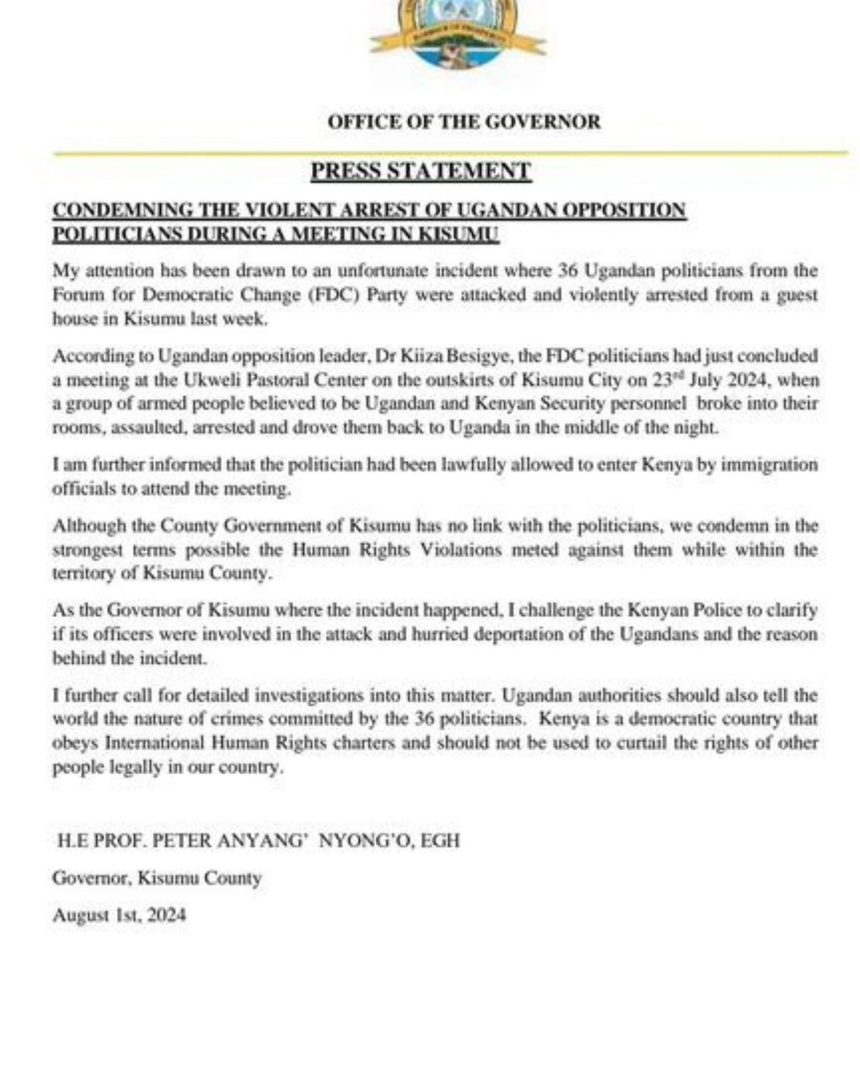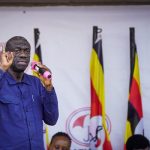Governor Peter Nyong’o of Kisumu has criticized both Ugandan and Kenyan authorities for their role in the recent detention of Ugandan opposition members from the Forum for Democratic Change (FDC). According to Nyong’o, the Kenyan authorities were convinced by unsubstantiated claims from Ugandan officials and participated in the mistreatment of the FDC activists.
The activists were reportedly involved in a legitimate training session in Kisumu when they were detained. Nyong’o argues that Kenyan authorities should have verified the claims from Uganda before taking any action. The situation has raised concerns about the due process and the handling of political dissidents across borders.
Professor Peter Nyong’o, the Governor of Kisumu County, has issued a strong and clear statement condemning the treatment of 36 FDC activists who were recently arrested in Kenya by Ugandan security forces. The activists were charged with terrorism and are now being held in Kitalya and Luzira prisons in Uganda.
Governor Nyong’o’s statement denounces the harsh and inhumane conditions faced by the detained activists. He has expressed deep concern over the manner in which the activists were treated following their arrest and subsequent transfer to Ugandan custody. According to Nyong’o, the activists’ treatment reflects a serious violation of human rights and undermines the principles of justice and fairness.
The 36 activists, who were initially arrested in Kenya, were accused by Ugandan authorities of participating in terrorism-related activities. The charges have been met with widespread criticism from various quarters, including international human rights organizations and political leaders.
Nyong’o’s statement adds to the growing calls for a review of the activists’ conditions and the legal processes surrounding their detention. The Governor has urged for a fair and transparent investigation into the treatment of the activists and has called for their rights to be upheld in accordance with international standards.
Bobi Wine, the leader of the National Unity Platform (NUP), has also strongly condemned the recent arrests and subsequent charges against 36 FDC members in Kenya. According to Wine, the Ugandan government detained the activists illegally for one week before forcibly deporting them and charging them with treason. This action has been described as part of a broader pattern of oppression against those who oppose the current regime.
In his statement, Wine highlighted the unjust nature of the charges and the harsh treatment of the activists, who were paraded in court following their deportation from Kenya. He criticized the Ugandan government for viewing legitimate opposition activities as threats to its authority, accusing President Yoweri Museveni of becoming increasingly paranoid in his attempts to retain power.
Wine also drew attention to the broader issue of political repression in Uganda, noting that the detained FDC members are not alone. He pointed out that many other political prisoners, including those from his own party, have spent years in detention without trial. This situation, according to Wine, reflects a systemic problem of human rights abuses and political persecution.
The NUP leader called for collective action to end the ongoing persecution of political opponents in Uganda. He emphasized the need for unity in addressing these issues and demanded the release of all political prisoners in the country.
The case of the 36 FDC members has further fueled the debate over political freedoms and human rights in Uganda, highlighting the ongoing struggle between the government and opposition groups.



















